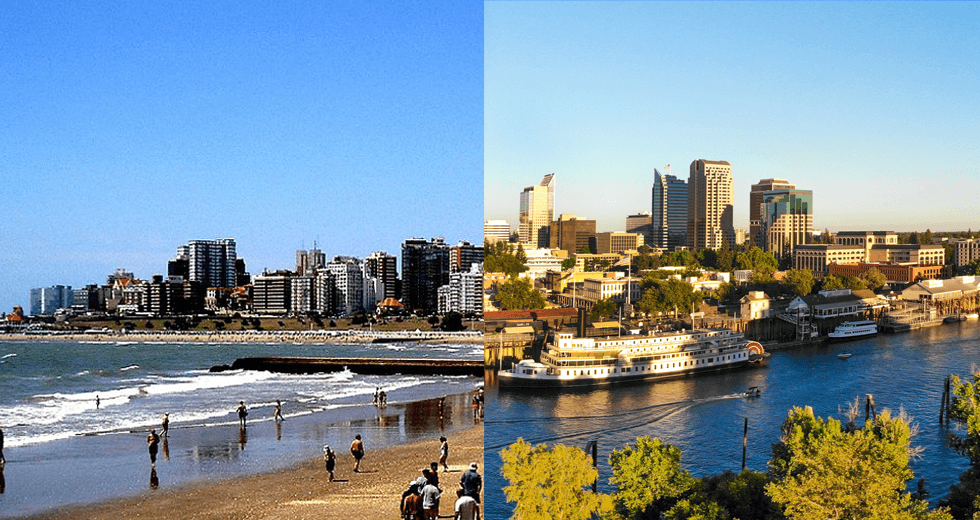I live in two side-by-side worlds. I tell you, for me it is a wonderful gift. I enjoy the people, the culture, and the much slower pace of life each time I return from California to Mar de Plata, Argentina. The two worlds illuminate themselves as I receive the inevitable question.
“Where are you from?”
I say, “I’m from California.”
They always follow with, “Why did you leave California and come to Argentina?”
“Good question.”
I enthusiastically continue my lesson. California is very rich in things, but poorer in relationships. Argentina is not very rich in things, but rich in relationships. From the first day of arriving in Argentina, I have witnessed people taking time every day for family and friends. They don’t take coffee on the run; they sit, talk and drink coffee together. Two- to four-hour lunches or dinners are normal, with talk, talk and more talk. And then there’s “mate-time,” 15 to 30 minutes or more to just stop and visit. The ritual of taking mate is embedded in the culture of family and friends. There exists nothing to compare the ritual of taking mate as a social act in the U.S.
People in California and Argentina live in two different capitalist systems and two different value systems. Dollars and money assets move freely in and out of the United States. Americans exchange one thing for another easily, quietly and transparently. We value freedom of choice, and we set a higher value for possessing things and dollar wealth. Our great and wonderful economic system allows us to deal easily with uneasy financial changes. If we experience a recession, we can and do print dollars, and if we have inflation, the Federal Reserve can limit dollars. We possess hard currency, which has real value, like gold. What a gift! Other countries don’t possess this gift.
Mar de Plata, Argentina, where I have lived for the last 18 years, is founded on a very different capital system, a different value system and a different culture. Mar de Plata is a beach city 250 miles southeast of Buenos Aires. Imagine for a moment that you are living in Los Angeles with its values, its culture and its daily life, with all its disruptive energy, versus living in Sacramento. There is no question that these cultures exist in two separate worlds.
Let me stop for a few moments and put on my real estate hat and my economics hat. Not all inflation is the same. It can have a different cause and it can affect people differently. Sacramento has been experiencing a housing price crisis. The cause supporting this crisis is a phenomenon, which will continue and spread across our nation.
Workers are spreading their wings and moving out of overcrowded, expensive cities that are perceived as unsafe. Having received big profits from the sale of their expensive homes, they are bidding up the prices of Sacramento homes. Real estate agents sit in a living room presenting offers to buy, bidding up the price above the asking price. This process is familiar to me because I once sat in those living rooms bidding up the prices of homes.
As part of my research for this article, I was able and blessed to interview Dr. Elizabeth Huffman, an assistant professor of political theory and international political economics at Cosumnes River College. She is an expert in the field of the forces that drive economic policy. Her insights and remembrances were helpful for the article. Huffman and I relived the out-of-control inflation of the late 1970s and 1980s. I was completing my economics degree and started three real estate offices just at that moment the Federal Reserve changed a 50-year policy.
For the prior 50 years, the Federal Reserve had controlled interest rates, keeping them low or raising the interest rate when inflation was going too high. The new decision was to control money supply, which meant taking money out of the economy, raising interest rates and letting consumer rates and mortgage rates go as high as they would. Because inflation was out of control, the Federal Reserve was not only determined to bring down the inflation rate but more importantly to drive out all inflation expectations.
They did a good job. They inflicted enough pain that we may never see 18 percent mortgage rates again, and inflation has remained low; during the last 20 years it has averaged 1-3 percent. What I remember most about those times was the panic to get out of money, not just into houses, but anything that had assess value, like refrigerators.
“Some of my friends have witnessed, here in Sacramento, real estate agents bidding up home prices,” Huffman says. It is true that raising housing prices add to inflation, but we must just live through the shift in values. The Sacramento house-bubble is an aftereffect of COVID and the shift of people realizing, because they can live and work at home, they do not have to live in L.A. or San Francisco. Why would they not move to Sacramento County where they can get more home for their money and more living for their life?
Our housing inflation is giving us a gift. All over the county of Sacramento there is a housing boom taking place: New homes are being built. Jobs are being created — high-paying jobs. Lots of money is circulating. Let us not forget the great value and culture we enjoy here.
Inflation is a complex story. It involves the money supply, the Federal Reserve discount rate, supply of food, the supply of energy, the demand for new technology, people’s expectations and much more. And as we awaken to all the aftereffects of COVID, we realize we are not the same people as before all the fears, deaths and the feelings of being out of control. And then, this inflation. We’ve changed, our world has disappeared; now we’re living in a reborn world. We may not see it or feel it, but here we are, changed people.
If you visit a grandchild you have not seen for some time, you recognize the many changes in the child. The parents, who are around daily, may not see them. There are two reasons for this: The changes are happening day by day, hour by hour, and we desire that things stay the same. We want safety, we want stability.
My research and interviews reveal that rising inflation following COVID generated an emotional reaction. Buyers didn’t panic; they responded with care and attention; they gave up impulse buying and moved their buying to discount outlets and bulk stores like Costco and Sam’s Club. A new big trend is paying with cash-back credit cards. Expect a competitive market in competing credit card companies.
Argentina, with its distinctive system, is experiencing a different kind of inflation and responding to it with different adaptations. Dr. Laura Seltzer, an Argentinian lawyer who was born in Mar de Plata, told me that three years ago inflation was 40 percent, but right now it is 100-110 percent.
Seltzer said that since she was 8 years old, she heard her mother and father talking about inflation. Sometimes it would be stable, and then it would start to increase. It came in cycles. But 2023 is extraordinary.
In the past, she says, most people considered poor in Argentina did not have jobs. Today, even employed people are poor. “They have jobs, they have salaries, they have benefits, they have all of this, but they are still poor,” she says. Even if their salaries increase, their raises are wiped out by inflation.
In the U.S., we are experiencing a parallel issue. People work — some two or more jobs — but they are still poor. And there are the retirees, many of them are still poor, even after working all their life. But Seltzer had this to say to Americans struggling with inflation: “The people of the U.S.: What I can tell is don’t worry about inflation. What you are experiencing as inflation is not real inflation to us.”
Argentina is experiencing crisis inflation. Its cause is multifold and complex, but mainly political. This is not the kind of inflation the U.S. is experiencing. The Federal Reserve is determined to drive out all expectations of future inflation, a carryover of the 1970 and 1980s. They have not gotten the message that the American people are no longer the people of the ‘70s and ‘80s. We’ve moved on.
Our challenge in 2023 is to value and honor our changed selves after COVID and inflation. Can we see and accept others as they are adjusting to their new worlds? Can we maintain balance, feel safe and remain open to all our new gifts?
–
Stay up to date on business in the Capital Region: Subscribe to the Comstock’s newsletter today.
Recommended For You

Harnessing the Power of Sports
Sacramento’s sports teams, big and small, invest in community programs to impact and educate local youth
Sports organizations like the Sacramento Kings and Sacramento Republic FC are linking with nonprofits to launch community sports programs that empower youth with life skills and STEM education.

Striving for Excellence
How the founder of local nonprofit Just Us United helps Sacramento’s youth
With his nonprofit Just Us United, Mister Harriel strives to
increase opportunities for Sacramento’s underserved youth to
succeed.

Art by Osmosis
Tahoe Elementary School’s new murals demonstrate a dedication to art education
A new mural project at Tahoe Elementary School
is demonstrating the school’s dedication to art
education and transforming students’ learning spaces.

No Room for Hate
How the pandemic coupled with anti-Asian hate is affecting businesses in the Capital Region
As the pandemic forced businesses across the Capital Region and the country to shut down, there has been an uptick in reports of anti-Asian racism and violence.




